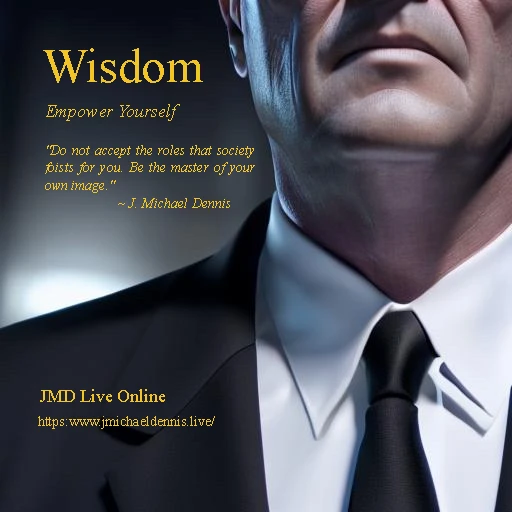The man or woman who intends to make his fortune in this world must be a chameleon susceptible of reflecting the colors of the surrounding times and atmosphere, a Proteus apt to assume every form, every shape, supple, flexible, insinuating, close, inscrutable, often base, sometimes sincere, sometimes perfidious, always concealing a part of his or her knowledge, indulging in but one tone of voice, patient, a perfect master of his or her own countenance, as cold as ice when any other man or woman would be all fire; and if unfortunately, he or she is not religious at heart, a very common occurrence for a soul possessing the above requisites, he or she must have religion in his mind, that is to say, on his face, on his lips, in his manners. He or she must suffer quietly, if he or she be an honest man or woman, the necessity of knowing himself or herself an arrant hypocrite. If your live is not getting anywhere, rebrand yourself, re-create yourself by forging a new identity, one that commands attention and never bores the audience. Incorporate dramatic devices into your public gestures and actions-your power will be enhanced and your character will seem larger than life.
BE THE MASTER OF YOUR PUBLIC IMAGE
When appearing before crowds, make sure not to be upstaged by anyone. Know to say a lot by saying a little, intuiting the moment to end a speech for maximum effect. Never fail to incorporate a surprise into your public appearances, a starling announcement that will heighten the drama. Understand that there is a vital link between power and theater. Make yourself an actor, and director on the world stage. Say your lines as if they have been scripted and move through a crowd with a constant sense of how you appear to your audience. Incorporate surprise into your repertoire, building drama into your speeches and make your gestures broad enough for the common man to grasp them instantly. Learn to enlarge your actions through dramatic techniques such as surprise, suspense, the creation of sympathy, and symbolic identification. Also, be constantly aware of your audience, of what will please them and what will bore them. Always make sure to arrange to place yourself at the center, to command attention, and never to be upstaged at any cost.
UNDERSTAND THIS
The world wants to assign you a role in life. And once you accept that role you are doomed. Your power is limited to the tiny amount allotted to the role you have selected or have been forced to assume. An actor, on the other hand, plays many roles. Enjoy that protean power, and if it is beyond you, at least forge yourself a new identity, one of your own making, one that has had no boundaries assigned to it by an envious and resentful world. This act of defiance is Promethean: It makes you responsible for your own creation. Being a costume that you can put on and take off whenever suitable, your new identity will protect you from the world. Forge yourself a new identity, one of your own making, that will set you apart and give you theatrical presence. Those in the back rows will see you and hear you. Those in the front rows will marvel at your audacity.
The The character you seem to have been born with is not necessarily who you are; beyond the characteristics you have inherited, your parents, your friends, and your peers have helped to shape your personality. The Promethean task of the powerful is to take control of the process, to stop allowing others that ability to limit and mold them. Remake yourself into a character of power. Working on yourself like clay should be one of your greatest and most pleasurable life tasks. It makes you in essence an artist, an artist creating yourself.
In fact, the idea of self-creation comes from the world of art. For thousands of years, only kings and the highest courtiers had the freedom to shape their public image and determine their own identity. Today the concept of self-creation has slowly filtered down to the rest of society and has become an ideal to aspire to. you must demand for yourself the power to determine your position in the painting, and to create your own image.
THE SELF-CREATION PROCESS
The first step in the process of self-creation is self-consciousness, being aware of yourself as an actor and taking control of your appearance and emotions. The bad actor is the one who is always sincere. People who wear their hearts on their sleeves out in society are tiresome and embarrassing. Their sincerity notwithstanding, it is hard to take them seriously. Those who cry in public may temporarily elicit sympathy, but sympathy soon turns to scorn and irritation at their self-obsessiveness. Good actors control themselves better. They can play sincere and heartfelt, can affect a tear and a compassionate look at will, but they don't have to feel it. They externalize emotion in a form that others can understand. Method acting is fatal in the real world. No ruler or leader could possibly play the part if all the emotions they showed had to be real. Learn self-control. Adopt the plasticity of the actor, who can mold his or her face to the emotion required.
The second step in the process of self-creation is the creation of a memorable character, one that compels attention, that stands out above the other players on the stage. Good drama, however, needs more than an interesting appearance, or a single stand-out moment. Drama takes place over time; it is an unfolding event. Rhythm and timing are critical. One of the most important elements in the rhythm of drama is suspense, keeping your audience on the edge of their seats, letting events unfold slowly, then speeding them up at the right moment, according to a pattern and tempo that you control. You must learn to orchestrate events never revealing all your cards at once but unfolding them in a way that heightens their dramatic effect. Besides covering a multitude of sins, good drama can also confuse and deceive your enemy. Other dramatic effects for your repertoire include the beau geste, an action at a climactic moment that symbolizes your triumph or your boldness. You must also appreciate the importance of stage entrances and exits.
Remember that overacting can be counterproductive, it is another way of spending too much effort trying to attract attention. It is less what you do that matters, clearly, than how you do it, your gracefulness and imposing stillness on the social stage count for more than overdoing your part and moving around too much. Finally: Learn to play many roles, to be whatever the moment requires. Adapt your mask to the situation, be protean in the faces you wear. Doing so, you cannot be grasped, and what cannot be grasped cannot be consumed.
ONE LAST WORD:
Bad theater is bad theater. Even appearing natural requires art, in other words, acting. Bad acting only creates embarrassment. Of course, you should not be too dramatic, avoid the histrionic gesture. But that is simply bad theater anyway, since it violates centuries-old dramatic laws against overacting.
JMD

J. Michael Dennis, ll.l., ll.m.
FREE SPEECH ABSOLUTIST / PERSONAL & CORPORATE FIXER
Systemic Strategic Planning; Regulatory Compliance; Crisis & Reputation Management

